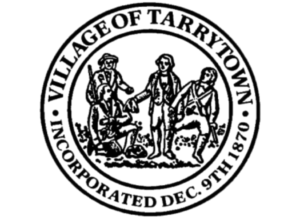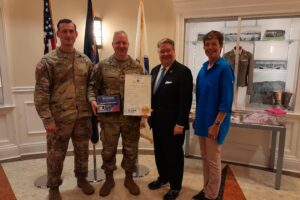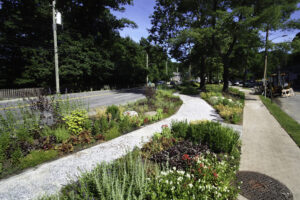 The Village of Tarrytown proudly announces its selection as the host community for the fall 2022 Climate-adaptive Design Studio. The Climate-adaptive Design (CaD) Studio is a semester-long course created by Cornell Department of Landscape Architecture Associate Professor Joshua F. Cerra that links students with Hudson riverfront communities to explore design alternatives for more climate resilient and connected waterfront areas. Offered in collaboration with the NYS Department of Environmental Conservation’s Hudson River Estuary Program, the fall CaD studio will feature the work of third-year graduate students and will take place from September through December of 2022.
The Village of Tarrytown proudly announces its selection as the host community for the fall 2022 Climate-adaptive Design Studio. The Climate-adaptive Design (CaD) Studio is a semester-long course created by Cornell Department of Landscape Architecture Associate Professor Joshua F. Cerra that links students with Hudson riverfront communities to explore design alternatives for more climate resilient and connected waterfront areas. Offered in collaboration with the NYS Department of Environmental Conservation’s Hudson River Estuary Program, the fall CaD studio will feature the work of third-year graduate students and will take place from September through December of 2022.
The Village of Tarrytown was selected to host the 2022 CaD studio through an application process that was open to all Hudson River Estuary waterfront communities. Letters of interest were solicited during the spring, and Tarrytown was chosen as the host site after a thorough review of seven applicant communities.
Mayor Karen Brown says of Tarrytown’s selection, “This is an honor and a big win for the Village of Tarrytown. It coincides with the heightened interest in our waterfront and will set the bar for sustainability and climate-resilience measures in future projects.”
The CaD studio assists municipalities in evaluating their waterfront and developing a vision for integration of diverse uses in ways that are visually appealing, highly functional, and resilient to flooding and other climate-related risks. The studio highlights the choices faced by communities impacted by sea-level rise, which is projected to continue through the end of the century and beyond. During and after the CaD studio, communities examine options, including nature-based solutions for stormwater and shoreline management, engineered shoreline reinforcements, adaptation of infrastructure at risk of flooding and inundation, and strategic retreat from highly vulnerable areas. The CaD studio emphasizes design principles that embrace water-dependent and water-enhanced uses, utilize nature-based solutions, and anticipate changing conditions over time.
The CaD studio process begins with a site analysis to better understand the host community. Student designers study land use, planning, zoning, local history, ecosystems, flooding and sea-level rise projections for the study area. They then meet with community members to develop insights into the needs and interests of the municipality. Students refine design concepts based on the information and feedback gathered during the community meetings, and seek to incorporate diverse perspectives into a cross section of design ideas ranging from the practical to the visionary. At the end of the semester, student teams share their designs with the community at an on-site open house.
The work of the CaD studio continues after the end of the semester. Staff from the Hudson River Estuary Program and partner organizations interact with the host community to identify design concepts with the potential for future implementation, and to share educational materials about the CaD studio at community events. Technical assistance and access to funding opportunities are part of the ongoing support provided to host communities that are interested in advancing CaD studio concepts.
Since 2015 the CaD studio has worked with the cities of Kingston and Hudson, the Villages of Catskill and Piermont, and the Town and Village of Ossining. In 2017, a CaD studio design team won a national American Society of Landscape Architects General Design Honor Student Award for their project focusing on Kingston Point entitled “Weaving the Waterfront”. To date, Kingston and Piermont have been awarded grants from NYS DEC for further design and planning of CaD-inspired projects on their waterfronts.
The Tarrytown CaD studio will feature three visits by student designers, which will include meetings with community stakeholders. The first community meeting will take place in September, a design workshop will take place in October and the final open house to share the resulting designs will take place in December.
Individuals with an interest learning about opportunities to participate in the Tarrytown studio can contact CaD team member Liz LoGiudice at liz.loguidice@gmail.com and can also refer to the webpage dedicated to the project on the Village website for updates: https://www.tarrytownny.gov/village-trustees/pages/climate-adaptive-design-studio-cad.
Designs from past CaD studios can be found at https://trophic.design/cad/. For more information about the CaD studio, visit tinyurl.com/CornellCaD.






